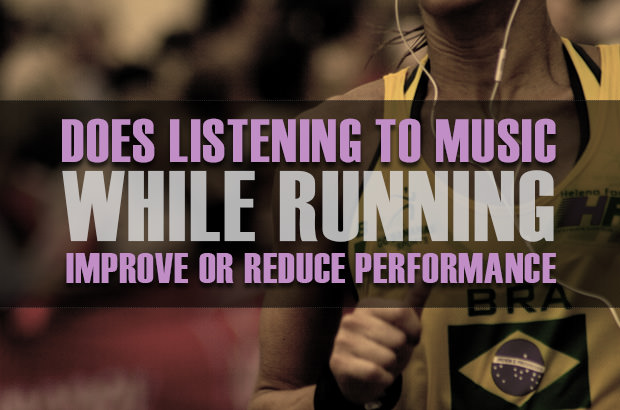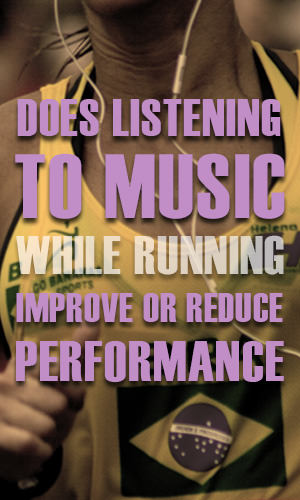
Does listening to music while running improve or reduce performance?
Submitted by Kim Allison
Posted on 03 Mar, 2020
Posted on 03 Mar, 2020

One of the age old debates amongst runners is whether music improves or lowers performance. So I decided to compile a list of opinions by runners and running experts on this matter. This is what they had to say.
A 2009 study by researchers at Liverpool John Moores University in England looked at the effects of music of different tempos on stationary cycling performance. Twelve subjects rode bikes for 25 minutes at a self-selected intensity level on three separate occasions while listening to popular music. Without the subjects' knowledge, the tempo of the music was manipulated so that it was normal in one workout, 10 percent faster than normal in another workout, and 10 percent slower than normal in the remaining workout. The subjects' average power output over the full 25 minutes was found to be 3.5 percent greater when the music tempo was increased. Their power dropped by 9.8 percent when the music was slowed down.
I can go either way. Not that fussed about the performance benefits - it's more about my mood at the time. If I'm going running to sort my head out after work I don't like having music.
But what about the filler runs? Those heavy-legged training runs when you have to force yourself out into the rain? Studies have shown that external stimuli, such as music, can block out some of your fatigue and spur you to longer distances and faster miles, reducing your perception of your body's limits.
To be honest, I never would have started running at all without music, and though I only use it for around 30 percent of my runs now, it hasn't hampered my ability to connect with my body or achieve a ‘flow state.’ It elevates my mood, helps me change up my paces, and gives me a needed burst of power late in a race. Sure, I enjoy plenty of my runs with the company of friends or my own thoughts.
During hard training sessions and racing, there are systems-checks to be doing constantly. Thinking about form, breathing, arm carriage etc all takes a lot of brain power and music makes it hard to concentrate on those things.
In a 2004 study done by researchers at England's Lincoln University, student volunteers completed a muscular endurance task while listening to self-selected "motivational music" and again while listening to white noise. The subjects were able to hold the weight significantly longer while listening to music.
Music is fine on the flat, if you want to run around ignoring the rest of the World. If you're running XC then the terrain will dictate pace and cadence - and music will do more harm than good.
There have been a number of studies on the relationship between music and exercise dating back until at least 1911 when Leonard Ayres found that cyclists pedaled faster while music was playing than when it was silent. Over 100 years later, in 2012, another piece of research showed that cyclists who listened to music required 7% less oxygen to do the same work as those who cycled in silence without music. So not only does music help us to push ourselves further and faster, it can also help us use our energy more efficiently. http://www.ncbi.nlm.nih.gov/pubmed/22828457
After all, plenty of studies have shown that music increases concentration, lowers perception of effort, provides ongoing stimulus and generally leaves you feeling more positive. Put on a pair of headphones, the thinking goes, and running feels easier and more enjoyable, so you get better at it. But, like most non-elite athletes, performance gains are only one small part of why I run. For me – much as I love to see my times drop – it's more about the joy of running for its own sake than it is about constant improvement. I'm sure those lab-based test results are true, but I'm not sure they really matter to me.
The benefits of listening to music when running are usually seen in amateur athletes and runners rather than professionals or "serious" runners. This tends to be because amateur runners use music as a way to escape from the run itself: music is a distraction and motivator to keep them going. For professional or serious runners, they already have the motivation they need to run and once you're good at something you need less distraction from doing it.
In a research project at John Moores University, 12 people rode an indoor bike at a pace they could sustain for 30 minutes while listening to a song of their own choice. In the second trial they rode again with the tempo of the music variously increased or decreased by 10% without the subjects knowledge. The findings showed riders' heart rate and mileage decreased when the tempo was slowed, while they rode a greater distance, increased their heart rate and enjoyed the music more at the faster tempo. Though the participants thought their workout was harder at the more upbeat tempo, the researchers found that when they exercised to faster-paced music, the participants chose to accept, and even prefer, a greater degree of effort.
Part of the training I associate with running is mental training and discipline. Having to push through boring runs and maintain focus allows me to work my willpower muscle.
Listening to music does not make you faster. Just because a fast runner can run with music doesn't mean that music makes you faster; it's known as a non-sequitur.
Breathing is something we don't always think about because it's passive. However, focusing on abdominal breathing or expansion of the belly and not the chest, allows you to take in more oxygen by completely filling your lungs. Without developing this style of breathing, athletes tend to breathe through their chest which is shallow breathing. Fast and efficient consumption and delivery of oxygen to the working muscles is crucial in endurance sports. Shallow or chest breathing will limit this process. Abdominal breathing will also keep you calm and relaxed. And, let's be honest, focusing on diaphragmatic breathing might be challenging if you're singing Lady GaGa's, I was born this way...!
Many runners struggle with cadence and leg lift. And it's difficult to hear the friction of your feet on the ground if all you hear is Eminem screaming at you. Next time you go on a run without your music, listen for the sounds of scuffing and "pulling off". The sound of scuffing generally means you are not lifting your legs and therefore your shoes are dragging on the ground. Some call it the Ironman shuffle. It can also be a result of slow cadence. Slow cadence equals more impact on the ground, which leads to more strain on the body. A pulling off sound generally means you are doing just that, pulling too much. Your hamstrings will work overtime and you will be utilizing more energy than needed.
I personally find headphone music far too distracting. The beat and extraneous noises across different songs are too random to assist maintaining a good rhythm. Many years ago in the army though I had an opportunity to spend time alongside our American friends in the US Marine Corps who always used magnificently entertaining and largely unrepeatable cadences to march and run to. These are an absolutely magnificent creation and work like nothing else to keep you going with a rock solid rhythm especially when you think you are going to pass out from relentless pounding along with a heavy load. The only problem is you tend to wake up in the night with the words rattling around inside your head months, years even decades later.
Running to a certain playlist can be useful over a period of time - if you're training to do a certain distance you can work out a playlist that takes roughly as long as you think you can do it in and try and "beat" it. Alternatively, if you want to increase your stamina, you can put together, say, a 30 minute playlist and keep running until it finishes. After a couple of weeks you can then add a song and do the same thing.
Sports scientists differentiate between runners who are "associators" – people who prefer to focus inwardly during a run – and "dissociators" – people who spend their runs looking for ways to forget what they're putting themselves through.
Although running to music can help improve your performance, it's interesting to note that you virtually never see an elite athlete - or even a very good club runner - listening to music while they run. This is because above a certain intensity level your brain needs to be more aware of what is happening to your body in order to regulate it - and it does this partly by listening to things like your footstrike, breathing etc. Associators and dissociators are not defined by personality, or preferences, but by intensity.
Runners and triathletes need to focus on form just like all other athletes focus on form. If a football player tackles with poor form, his chances for injury go way up. If a swimmer does not focus on form, she is less efficient. If you want to run pain-free and increase your performance, focusing on overall form is key. If the idea of listening to music is to tune your brain out, then it makes focusing on form extremely difficult.
The best runners tend to be attuned to running for its own sake from a young age, where as for the rests, of us it's still subconsciously unnecessarily masochistic.
Without music, I’m more in tune with what’s going on. Not having a music player is also one less thing to rely upon.
I prefer not to use music. Tried it a couple of times and just instinctively disliked it. I don't look down on people that use music when they run, but I do occasionally smirk when I see people with all the gear on having to stop and adjust their headphones or fiddle with their iPod or whatever.
The benefits of listening to music decrease with the level of intensity of the running. The faster you run, the less effect the music has.
I like to listen to my breathing more than anything else. It's an indicator of whether I'm working hard enough and a reassuring sign that I am not going to keel over and die.
So, how can mere sounds boost a person's physical endurance? The answer to this question has to do with the brain's role in physical performance. Exercise scientists used to believe that fatigue occurred when the muscles or cardiorespiratory system hit some kind of hard physiological limit. For example, the muscles became so acidic that they stopped working properly. It is now understood that such limits are never reached. Instead, the brain imposes fatigue before these limits are reached to protect the body from serious harm. Because the brain essentially chooses to impose fatigue based on a prediction of where the body's true physiological limits lie, the brain has some flexibility in setting performance limits. When an athlete is highly motivated, the brain will risk a bit more and allow the body to come a little closer to the point of self-harm in pursuit of better performance.
For me, music enhances my runs. If the songs i'm listening to are making me feel good then i find that I enjoy my runs more and finish in a brilliant mind-set.
I definitely used to get minor injuries more often when I used to use my iPod. I think we unconsciously aim to run in time with the music we play- and because we tend not to play slow-moving songs while running- we end up to pushing ourselves too hard. My times dipped immediately after removing the ipod but have since climbed beyond what I had achieved with music.
Photo Credits
Must Read Books For Runners

Born To Run
by Christopher McDougall
Chi Running
by Danny Dreyer
Running With The Buffaloes
by Chris Lear
Fuel
by Jeremy Chin
 Core Workouts For Running
Core Workouts For Running Runner's Guide On How To Prevent Plantar Fasciitis
Runner's Guide On How To Prevent Plantar Fasciitis 7 Tips to Reconnect With Your Creative Core
7 Tips to Reconnect With Your Creative Core Best Running Pitstops At A Road Race
Best Running Pitstops At A Road Race










